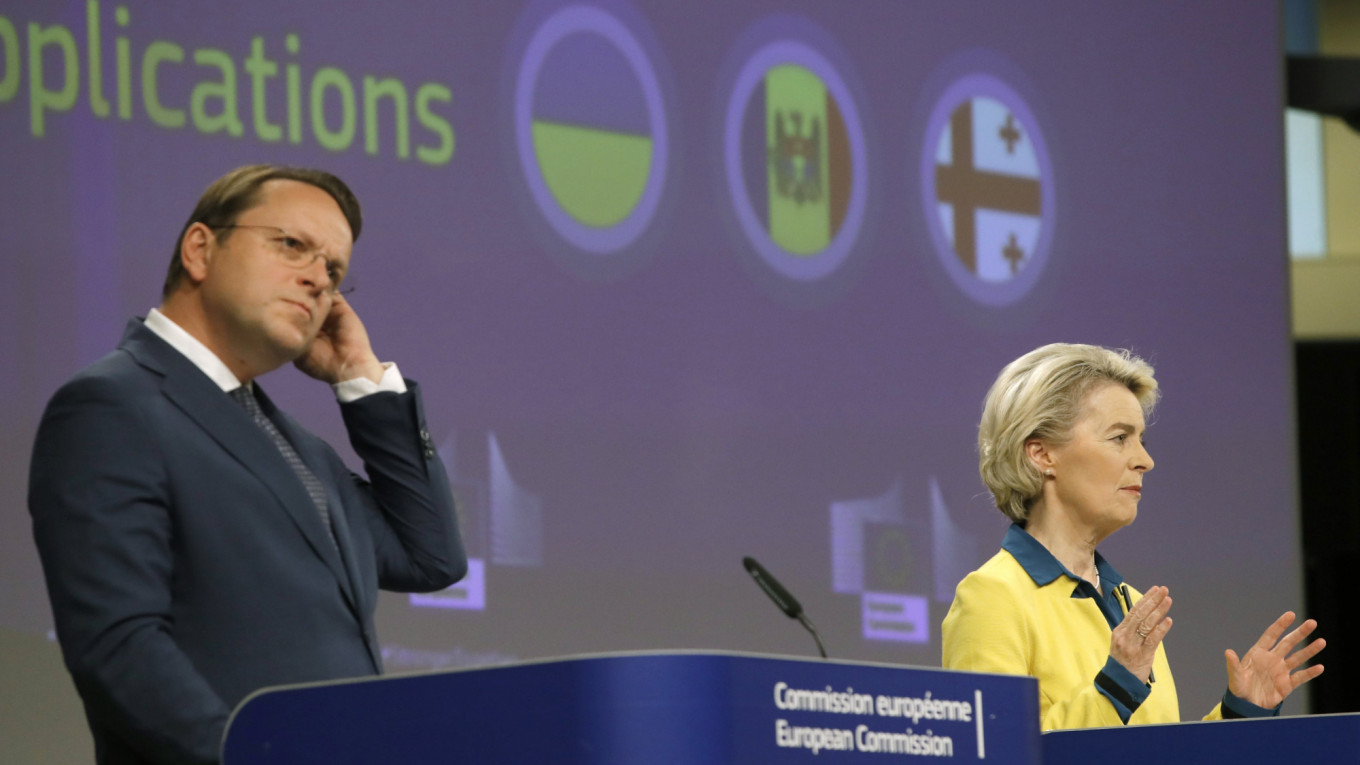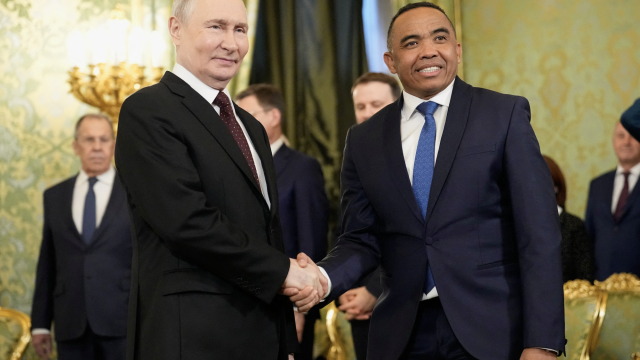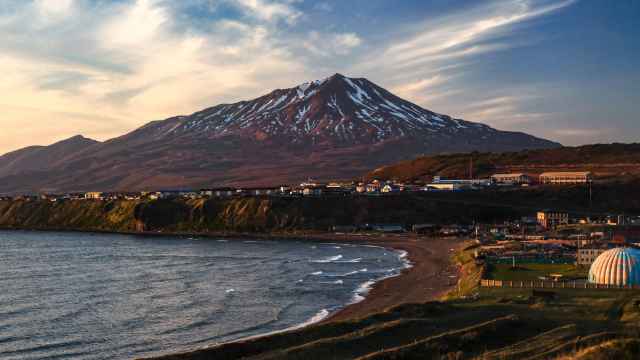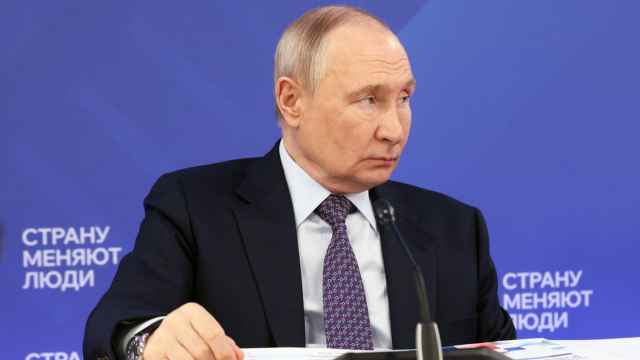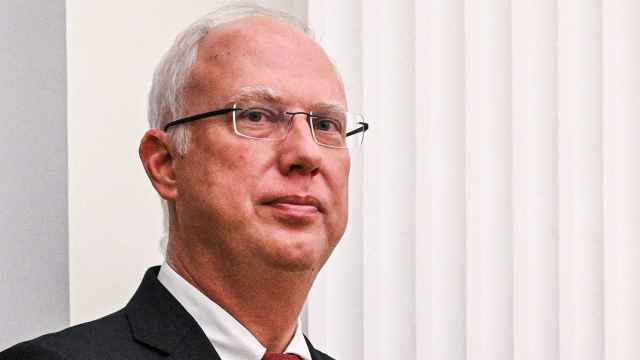Europe sent a powerful symbol of solidarity with Ukraine on Friday as Brussels backed Kyiv's bid for EU candidate status, a decision Russian President Vladimir Putin said he had "nothing against".
With the European Commission's backing, Ukraine could join the list of countries vying for membership as early as next week, when member state leaders meet at their Brussels summit.
All 27 leaders have to agree to the candidacy, but the heads of the bloc's biggest members -- France, Germany and Italy -- gave full-throated support to the idea on Thursday, on a trip to a war-torn Kyiv suburb.
On Friday, the European Commission gave formal backing to the bid, and EU chief Ursula von der Leyen made her position clear by donning a striking jacket in Ukraine's national colours.
"We all know that Ukrainians are ready to die for the European perspective. We want them to live with us for the European dream," she said.
Ukraine's President Volodymyr Zelensky immediately welcomed the decision as a "first step on the EU membership path that'll certainly bring our victory closer".
He thanked von der Leyen for the commission's "historic decision" and said he expected that EU leaders would give Ukraine a "positive result" at the June 23-24 summit.
Putin said Russia had "nothing against" Ukraine joining the EU, saying it was "their sovereign decision to join economic unions or not" -- unlike the security risk he sees in Kyiv joining NATO.
But he said membership of the European Union would turn Ukraine into a "semi-colony" of the West.
Russia had earlier said the West was "manipulating" Ukraine with promises of integration.
As Brussels celebrated their breakthrough, British Prime Minister Boris Johnson returned to Kyiv for his second visit since Russia's February 24 invasion.
"Many days of this war have proved that Great Britain's support for Ukraine is firm and resolute," Zelensky wrote on social media.
Johnson's office tweeted a picture of the premier meeting the Ukrainian leader, carrying a stack of books and paperwork under one arm.
"My visit today, in the depths of this war, is to send a clear and simple message to the Ukrainian people: the UK is with you, and we will be with you until you ultimately prevail," Johnson said.
According to Downing Street, Johnson offered to launch a major training operation for Ukrainian forces, to train up to 10,000 soldiers every 120 days and "change the equation of the war".
Each Ukrainian soldier would spend three weeks on the British training course, learning combat tactics, basic medical skills, cybersecurity and counter explosive tactics.
Russian bombardment
Once Ukraine joins the EU candidates' list -- alongside several countries in the western Balkans -- it could still take years to meet all the formal membership requirements, even if Kyiv prevails in the war.
"Ukraine should be welcomed as a candidate country -- this is based on the understanding that good work has been done but important work also remains to be done," von der Leyen said.
And in the meantime, the fighting continues, with Russian forces bombarding pockets of Ukrainian resistance in frontline Severodonetsk, including civilians holed up in a chemical plant in the eastern Ukrainian city.
Moscow turned up the pressure on Western allies, sharply reducing flows of natural gas in its pipelines to western Europe, driving up energy prices.
France's network provider said it had not received any Russian gas by pipeline from Germany since June 15, and Italy's Eni said it expected Russian firm Gazprom to cut its supplies by half on Friday.
Several European countries, including Italy and Germany, are highly reliant upon Russian gas for their energy needs and, as the West sides with Ukraine, Moscow is cutting supplies.
'Extremely alarming'
Berlin and Rome have rejected Russia's argument that technical issues have caused the drop in supplies, arguing that state-owned Gazprom's move is political.
But western Europe is sweltering in a heatwave and energy prices are already soaring, adding to runaway inflation and industrial action in several economies.
The situation is, of course, starker in Ukraine itself, where Russian troops have occupied a swathe of the south and east of the country during the 113-day war, including much of the Donbas region.
"The humanitarian situation across Ukraine -- particularly in the eastern Donbas -- is extremely alarming and continues to deteriorate rapidly," the UN humanitarian agency, OCHA, said.
The statement said the situation is "particularly worrying in and around Severodonetsk" -- where bloody battles have raged for weeks.
Severodonetsk is in the Lugansk region, where governor Serhiy Haidai called for a ceasefire, stating hundreds of civilians were trapped in the besieged Azot chemical plant in the city.
"It is now impossible and physically dangerous to get out of the plant due to constant shelling and fighting. There are 568 people in the shelter, including 38 children," he said.
'God's will'
Haidai said earlier this week that around 10,000 civilians remained in the city, which is controlled mostly by Russian forces.
In the frontline Donbas village of Adamivka near the city of Sloviansk, a community of Orthodox nuns have seen a rocket hole blasted into the wall of their well-tended garden.
Under near-constant bombardment by Russian forces, Sister Anastasi and a group of other black-clad nuns and pilgrims live day-to-day, praying for deliverance.
"We are all alive, yes. No one has left. This is our home," she said quietly, her face framed by a black veil, as shells crashed in the distance.
"We trust in God's will, in God's help, in the help of all the saints and the Holy Virgin. This is our home, we have nowhere else to go."
At least two people were killed and 20 injured in a Russian strike on a residential area in the southern Ukrainian city of Mykolaiv, the local governor said.
Separately, Zelensky announced an end to the visa-free travel that Russian citizens, many of whom have Ukrainian relatives, have enjoyed since Ukraine became independent from the Soviet Union in 1991.
A Message from The Moscow Times:
Dear readers,
We are facing unprecedented challenges. Russia's Prosecutor General's Office has designated The Moscow Times as an "undesirable" organization, criminalizing our work and putting our staff at risk of prosecution. This follows our earlier unjust labeling as a "foreign agent."
These actions are direct attempts to silence independent journalism in Russia. The authorities claim our work "discredits the decisions of the Russian leadership." We see things differently: we strive to provide accurate, unbiased reporting on Russia.
We, the journalists of The Moscow Times, refuse to be silenced. But to continue our work, we need your help.
Your support, no matter how small, makes a world of difference. If you can, please support us monthly starting from just $2. It's quick to set up, and every contribution makes a significant impact.
By supporting The Moscow Times, you're defending open, independent journalism in the face of repression. Thank you for standing with us.
Remind me later.


